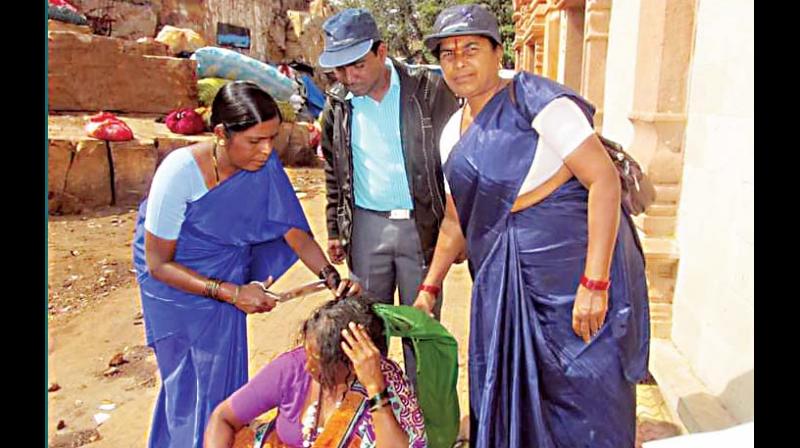Urban Legend: Conquering a cult Seetavva shows it can be done
Seetavva was only seven years old when her parents pledged her to goddess Yellamma.

Fighting an age-old shameful practice and shrugging aside the shame which comes with being a Devadasi, Seetavva Jodatti of Belagavi has proved that determination and dogged spirit is all that a woman needs to rise to the top. At seven, she was a Devadasi, today she heads MASS, a prestigious organisation which works for the welfare of Devadasis, rebuiding their lives and helping them gain acceptance in society. Naushad Bijapur traces the roots and the rise of this amazing woman who has been awarded the Padma Shri for her unique effort.
She has travelled a tough road, living life as a Devadasi , raising three children born in the course of her journey through this world of pain that many are forced into by poverty- stricken families and then emerging like a butterfly from its chrysalis to help others like her find a way out to freedom and dignity. Now 43, Seetavva Jodatti has been recognised for her undaunting spirit and her courage to relcaim her life and that of others from the long shadow of the Devadasi tradition that has ruined many a woman's life in parts of the state, by the Union government, which has awarded her the Padmashri.
Seetavva was only seven years old when her parents pledged her to goddess Yellamma. Her family hailed from Kabbur, Chikkodi taluk and as she was the youngest of six daughters, her parents decided to give her up to the goddess for want of a son.
But even so, Seetavva managed to study until class 7, before quitting school at their insistence. On entering her teens, she was forced to live with a man as a Devadasi and soon gave birth to a daughter and son, but to her misfortune her partner died , leaving her in an abject poverty with two children to raise.
Left with no option Seetavva took to working as a daily wage labourer in Chikkodi taluk, but was once again forced by her family to live with another man. Her third child was born from this union.
But far from letting life get her down, Seetavva has made sure her children got a good education. Her oldest daughter has done her Pre-University, her son has qualified from an ITI and her younger daughter is a class 8 student.
But Seetavva did not rest with merely taking care of her own family. In 1997 she began a non-governmental organisation called MASS (Mahila Abhivrudhi-Samrakshana Sansthe) in Ghataprabha, Belagavi district to help women like her escape the clutches of the Devadasi system and live a life of dignity. And she can now proudly look back at the last two decades as her efforts during this time have helped bring over 4,800 Devadasis into mainstream society.
“MASS is run entirely by Devdasis, all of whom are illiterate, except for me. And yet we have managed to rehabilitate many Devadasis and helped them improve their financial status. My organisation has also ensured that their children got a good education and jobs,'' recounts Seetavva, adding, “ I am proud of all the measures taken by MASS.”
Besides the government, which funded MASS for some years, the organisation gets financial help from several foreign NGOs to implement its programmes for rehabilitation of the Devadasi families.
Seetavva also has her own legal team, which gives legal support to Devadasi families and helps create awareness about the need to do away with this humiliating tradition in Belagavi.
Although banned in 1987 the practice of pledging women to goddess Yellamma continued clandestinely in parts of north-Karnataka for years and those who fell prey to it lived a miserable life, virtually boycotted by society. But now through the efforts of MASS many have rebuilt their lives and are gaining people’s acceptance.
Not forgetting other women, who are socially and economically backward, Seetavva has several programmes to help them too .
“Our work helped by the government has brought the Devadasi system to an end in the state and now innocent girls are no longer being pledged to the goddess like in the past. There could be some isolated cases of girls being exploited , but they are not becoming Devdasis for sure,” she says confidently.
Happy that her tireless efforts on behalf of the Devadasis has gained her such high recognition from the government, other organisations involved in a similar battle agree that it is a fitting award for a woman who exemplifies the saying, “When the going gets tough, the tough get going.”

